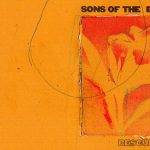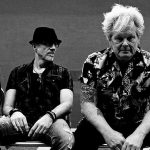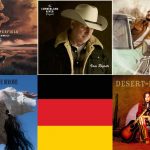Good things last a while: a couple of factors lead to the situation that there have been almost two months between the point in time the interview with Tom Ganter in fact took place and its publication today. Tom is not only very well known in the German country music scene as the drummer of Nik Wallner. He is also one of the few CMA (Country Music Association) members in Germany. He is an expert for domestic and international country music. In our chat, we talk about the 2025 Country To Country Festival in Berlin as well as the general situation of country music in Germany. A very intense and interesting chat. Enjoy!
Spotlight – Flyctory.com meets Tom Ganter
FLYC: So, in order to start, let’s get a bit into into you and then how in your musical career. What made you get into music in general?
Tom: Oh, that’s a that’s a great question. I got never this question. No, just kidding. It is, you know, I started with music in my really early days since my ground school in age of six or so. I started, you know, playing piano on a more classical kind of way. And I learned pianos ten years long, I think. And then, really late, with roundabout 14, 15 years, I switched over to drums. My dad is also a drummer, or he was a drummer in his early years. But then he got kids, he got us, and then he needed to switch to a “better” job, however you want to call it. From his past time, there was a kind of a old Yamaha drum set in our house at that time. I still have this kit and I still play it. So, when I’m playing smaller club gigs or, sometimes, weddings, then this kit is still in use. So I got it from my father.
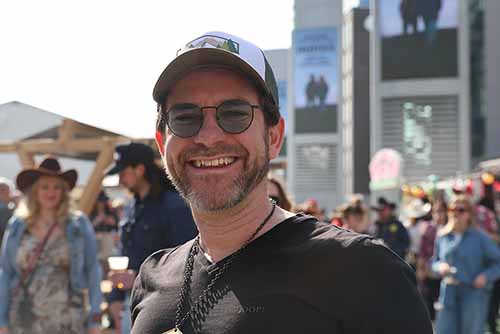
My grandfather from from my dad was also a professional musician. He was multi-instrumentalist. He played the violin, the piano, upright bass, and so on. So he was really an absolutely fantastic musician. As I said, I switched over to drums, with 14 or 15. I took some lessons from some teachers here in our region in the Southern part of Munich. Then in Munich, there is still a great private academy, Drummer’s Focus is its name. And then I studied there two or three weeks long. I was just mainly hopping from one teacher to the other because I’m left handed. At that time I played the drums the other way, right handed. And I always had some issues in my brain to focus on how to play the right way, how to groove the right way. This is a really a big problem when you start your instrument playing on the other side. There are some professionals in the States who are playing the other side and never have problems. But I had big issues. And in this school in Munich, at Drummer’s Focus, some of the left handed teachers that told me, Tom, why don’t you play left handed? You’re a left handed guy. You play right handed. It doesn’t make sense. I had some challenges over the past time in my musical history. All that was in the “era” of the first wave. I would name it, you know, that in that kind of way.
FLYC: How did you make it into more professional music?
Tom: The second wave in my career started when I I had my first bands. I was doing some, you know, gigs, gigging here for, you know, all the carnival or Fasching stuff and weddings and so on. That was my second wave. And the third wave really was then when I got myself over to New York. I started drums in 2018 at a private academy over there in midtown Manhattan. It is called the Drummer’s Collective. It’s really great because this was a great time for me. It was a one semester full time study over there. So jazz, modern music, modern, modern musical stuff on drums. I’m still meeting some peers, also in Switzerland, Austria, Germany, who also studied over there at the Drummers Collective in New York. So, you know, they are playing for Sing Meinen Song or with many artists, they’re on tour. Some are also playing just as session musicians in their studios. And it’s great to have discussions with them. How was it, you know, playing or studying at the Drummers Collective in New York, ten years before I went over there, because they started in 2001, for example.
That was the change for me, really, because, you know, you can imagine when you study in America, in New York or, for example. in Nashville, where I have been last year many, many times or in Los Angeles, you get a complete different kind of mindset. It’s about how you what this instrument to be for you. It’s about what what can it be for you, what you are, who you are. And it is not that some somebody or anyone tells you that you are good on this instrument. So you get “punished” day after day, month after month in a kind of way of you cannot play it the right way. Because if they would tell me I’m good, then I would never learn anything. That’s it. They are so straight. And that is what I really love about the Americans, because the US guys are just transparent. They are simply honest about what you can play and what you can cannot play. Mostly about what I cannot play.
FLYC: What is drumming alike the Tom Ganter way?
Tom: In the US, I figured out what kind of types of music would be the best fit for me as Tom. I’m individual, as every one of us is, and my fingerprint is groove stuff. I love it. I love groove. I love everything that is slower, mid-tempo, mainly, okay, sometimes also a bit funky stuff. But all what is connected to groove music. I’m not a real that kind of R&B guy. Many of the musicians who are reading this, this interview or hearing it is, they would say, okay, R&B is definitely 100% groove. Yeah, all kind of genre is groove, you know, connected. But it’s more,
And then I got my focus on Nashville and all this country music. This was six years ago, around about six and a half years ago. And since that time, I’m just doing that 100%. I was switching from rock and pop over to funk and then straight to new country. I mean, it is pop rock, as you know. And I have a lot of fun with it, because of what I hear and see from other musicians. how they fulfill this kind of genre, how the genre is developing itself with hip hop, as said R&B, with soul like Teddy Swims and so on. It is amazing. And I love that motion. It is so great to hear with Thomas Rhett and Teddy Swims, you know, this co-op. I love it. And this is the way I want to focus on the next years, definitely.
FLYC: You played a lot of gigs, not only on the country music side. you played with Anastasia, you played with Andreas Gabalier, for example, in Austria. Is there any gig, which you remember especially well?
Tom: It is definitely the it is the gig in Austria where I played in a tennis stadium with all the names you just pulled out. So Anastasia and Andreas, because it is it was a special moment for me, really. And It was the kind of vibe or the feeling on during that that night. And maybe it was because also of the conditions. It was, for sure, thousands of thousands of people around you. It was a 360 degrees stage. That makes really a lot of fun. I was a quite a bit nervous because of the weather condition. There was no roof. So it was open and in July and it was so slightly before it got the thunderstorm and rain. So it was really a very … interesting. But then in the end, when you’re on stage, it feels completely different. You are free and it just makes fun.
It is interesting when you play gigs like that and you see, you know, many different artists on the same stage. You are able to play with them – or get the chance to play with them one after the other. It is interesting to see how they interact on the stage. So Andreas Gabalier, for example, interacts completely different compared to Anastasia. For sure, Anastasia is a global megastar and she has a completely different style. Her history is much longer compared to Andreas’ history. And Andreas is a different person. And he believes in different things. He sings his songs about different stuff. It was just fun. I cannot tell anything else. It is quite a challenge, for sure, to play it the right way with them. But yeah, it was just fun.
FLYC: The focus of the interview, of course, is on a new country, on German country scene and country music development. Do you maybe have any favorite German country music artist?
Tom: Yeah. As you know, I’m playing drums for Nik Wallner. He still is the go-to guy for me, not just because of my membership in his projects. It is because of the music itself. It got created also with the main support of the producer, Tom Ulbricht from Berlin. And today, I was in my studio and I was playing to the songs to the full album. I do it really all the time when I’m on drums, just also for my warm-up routine. Anytime, again, again, and again, year after year, I feel that there’s the great professionalism behind these songs. Not just because the songs got recorded in Nashville, which is great because the production quality is on highest level. It’s also the lyrics, it’s the vibe behind the songs. And when you imagine, it is one of the first or it is the first professional produced new country albums made in Germany or out of Germany, really. It was just finally recorded in Nashville. But the first step was here. So Nik is the first singer songwriter officially, in my opinion, who was focusing on new country the right way with the professional setup.
And you know that for sure on my end all the time emotions because I played so many gigs with Nik already on different stages. We were touring also one time with Rea Garvey as support artists. We were doing so many different things and also played just little, little gigs at Tegernsee, which was also fun. But there are the emotions behind it. And this is why I love playing music. When you are part of different projects in your career, and you look back, you just have to listen to the songs. You don’t have to open up an album or, you know, scrolling down your photos on your iPhone. What you also can do for sure about it is, you know, when you’re hearing the stuff you played, you instantly remember where you played that stuff. And you remember so many different situations. That is one of the thousands of reasons why I love music.
FLYC: So one recent event where we met as well was the Country To Country 2025 in Berlin. How did how did you feel about the festival? Did you have any special takeaways from it, maybe?
Tom: To my to my shame, I had to leave on Saturday. So I was not there on Sunday, and I missed Lainey Wilson and Nate Smith. That that was that wasn’t good. But I had to leave. You know, there was no there was no chance to to there. But one takeaway was for me important to see the music scene for new country. How big the crowd is, how many people are going there. It was for me the first time visiting C2C. And also, when I was interviewing different artists, I was doing that for a German country website mainly. Talking to them, discussing with them how they feel here to play here and stuff in Berlin and so on. It was, it was interesting for me to feel the different vibes, to see on what kind of level the acceptance of new country currently is in Germany. I was a bit surprised that it so I expect I expected sometimes more people. But on the other hand, the venues at this festivals are what they are. You cannot take more or do not offer more people. Sometimes, when the rooftop bar at the Alex is full or something, it doesn’t make sense – more people would not fit in.
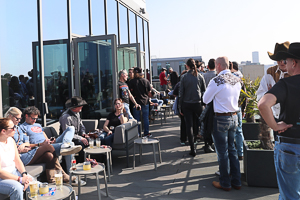
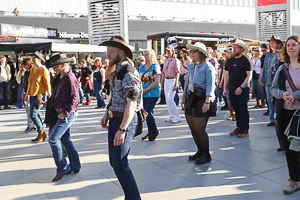
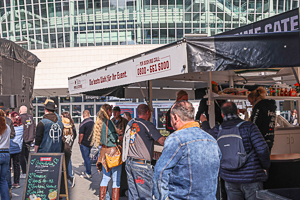
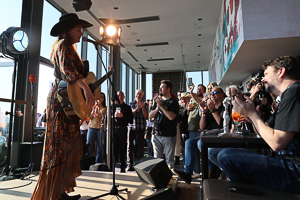
So on the one hand, I was surprised how good, you know, how everything works so smoothly in some way. The setup is very similar in a kind of way compared to the CMA Fest in Nashville, which I like the most from the setup point of view with the different bars, the different locations. And then you can, you know, walk around like on Broadway in Nashville. You cannot compare it at all for sure. Nashville is Nashville. But, there have been some little things, which I was not really happy about. I already gave this feedback, very transparently to the people who are responsible for the festival. They were very happy to get their feedback and they tried to make it better next year. But , from an artist point of view, 49 Winchester was definitely my favorite on Saturday.
FLYC: Also in contrast to previous C2C Berlin editions, there was no German artist on stage, and also a very low number of European artists. . What do you feel is missing in the German and European country scene that they can present themselves in a festival like that?
Tom: I mean, it’s a culture problem. It’s it’s a culture problem here in Germany. That’s it. That’s everything what I can say about because you see it in in different industries, different branches everywhere. Especially in the entertainment industry that you have to get to the point as an artist with a number one hit and to be in the charts. After that point in time, you don’t have any problems. You get your stages, you get your acceptance, you get your visibility. But until that point, you never or rarely get the support which would be needed for this person. You know what I mean with that?
This is a culture problem. In the States, when we compare it with the States directly in Nashville, it is completely different. You have a hundred percent support for everyone. For sure, you have to ramp up your personal career, playing on Broadway, playing your stuff, make your things work by your own. You have to understand the business, which is very important. It is not just playing great music and sing good and have a great voice and playing your instrument well, mostly naturally your guitar. It’s also understanding the business side, because it is important to know what the labels are doing. How they interact, how the partners in this industry are working together, and what is important behind the scenes. And it is as it is, as everywhere it is money.
And what you can do as an individual is to find your individual fit as person. Nik, for example, with your music, what you love to make. And when we take, for example, Taylor Swift. She is jumping from one genre to the other, always developing herself. She started, as we all know, also with country music in Nashville. And now she’s playing straight pop stuff, mainly. And in five years, maybe metal. I don’t believe it, but maybe so. I mean that kind of acceptance that every everyone should get the possibility to play and to be visible on stage.
FLYC: What are the important points to change that, in your point of view?
Tom: First of all, we do not have the right stage setups in Germany. Never. So nothing in Munich, really nothing really in Cologne and Berlin. I mean, there are stages, there are club stages. We have a lot of stages. But not the right sort of set up behind the stages. Getting on the stage is not is not the right as well. And also the labels here in Germany are very reserved or behind the motion, so to speak, in pushing newcomers. So it’s a culture problem in Germany. Germans are not made for pushing newcomers. They do, but just in a way of they can really calculate in six months, there’s a heavy income with this artist when we try to start a stadium tour. Ayliva, for example, she’s the perfect example. And she’s just a copy paste, in my opinion, from another act in the States. This is not an individual thing made in Germany.
You know, we are lacking with great musicians from time to time. Mainly we have great professional musicians in the main areas like Munich, Berlin and so on. But we are lacking definitely with our industry. This is something where I try to get my foot into a little bit. I also studied music management in a kind of a way where I where I try to always overseeing the current status in the different countries. So not just in Germany, also from a European point of view, also from a American point of view. I’m really interested in focusing on the charts, focusing on the listeners, on all that stuff that comes out of the streaming portals from Spotify, Tidal, and so on. Many times I come to the conclusion numbers are sometimes telling you nothing. It is mostly a cultural thing where we have to get better here in Germany. It is as it is. It is really a hard pill to swallow in some way. Because when you want to start as a musician, as a singer songwriter, your career, you have to have the magical ten years. And in these magical ten years, you have to just keep yourself alive, really. Then, maybe, you find the point to get started and getting famous and really sharing your great music and your vibes.
FLYC: That leads to my next question very nicely. On the one hand, I think people in Germany still think about country music in a very traditional way and think about also country schlager. On the other hand, for example, last year, we had Dasha and Shaboozey, who both made it into the German Top 15. Dasha even had a golden record in Germany with a country song. But when I look into the promotion portals, for example, these songs are very often flagged as pop or rock music and not as country music. So how can we change that and promote the genre in Germany?
Tom: We have a kind of a barrier here in Germany, which is the language. Um, so I guess, so I would assume that 70% of the people are okay. Uh, there are now a younger generations also, you know, visiting the C2C, but, uh, I guess at least 40% do not understand what the guy is singing on stage. It’s not a natural mother language. I think this is the barrier, really, in Germany. You cannot change this. Therefore, for example, Nik Wallner has his songs, as you know, in German. And we tried to figure out, does that work better or not here in Germany. That is one thing. And it’s also, you know, when you understand the mechanism and the system behind the industry as I quickly described before. The radio stations or TV channels are not really interested in pushing the music as a genre. Country is, in my opinion, the best music genre in the world with the best storytelling, the best instrumentation and so on. And because, you know, they also want to see the listens in the first stage.


That’s the same problem with pushing newcomers who needs to have a number one chart hit to be recognized. And this is the same situation with the genre itself. That is why I really highly welcome that we have the C2C copy from Glasgow and London. It gets a little bit of attention. The festival was, I guess, one or two times in TV including the SAT.1 the good morning TV. But then, they are just showcasing the line dance and stuff. In my opinion, that’s the complete, complete opposite of what we should do here in Germany. That’s the wrong way. Whoever wants to dance line dance is highly welcome. It’s not my personal most loved dance, but however, this does not really support the younger generations, in my opinion.
FLYC: What could be done better?
Tom: They should really be focusing on how great the music is. So what comes out of the musical hands from Post Malone. And he is really a great guy, in my opinion, because he puts so f*cking enormously high pressure and effort into his album he released with the other 13, 14 guys. There is so much work behind these songs, and they are just showcasing the line dance on TV. And I was, you know, thinking about, wow, this is another year of shame. But it is as it is. I would do it completely different. And there are different barriers in the industry how we showcase it. And that is what I want to support a little bit. Also discussing the things with you now. And I highly welcome every interview. A few days back, I guess two weeks back with Deutschlandradio (national radio station). And I was presenting a little bit, what should we do and what the great music is. So talking about it, what we do now, right now, and what you are promoting with your interview is the great music. So what is the Nashville sound? What does it mean, actually? Is it a kind of an Americana or folk? No, it is the Nashville sound. And the specific new stuff from Luke Combs, Morgan Warren, Luke Bryan, Thomas Rhett, all these crazy f*ckers who are doing great music.
It’s just coming out of this town, out of Music City, and talking about it and explaining it is the first step, in my opinion. And then, listening to that stuff. I remember, for example, listening and I still do listen to Muse. Muse, I guess you know this band. It’s one of the best bands on this planet, in my opinion. And I needed several weeks to get into the music. It was one of the first albums that time. And it was with classical vibes and very high frequency singing stuff. And I was not really feeling good with it in the beginning. But in the end, I loved it and I still hear it in my car. But with new country pop and rock, new country R&B – you name it – it’s just great music. You just have to listen to it once and then you’re in. So it is very easy music. When you can speak English, understand English and understand a little bit the lyrics as a listener, you completely instantly understand, Okay, it is like compared, as you said in the beginning, compared to schlager sometimes. Talking about family, friends, heartbreaking situations. Yeah, it is a lot of talking about a lot of about freedom, about good vibes about enjoying the summer and drinks. From my point of view, how I feel the music, it is a very positive way of making music. So it is I love modern rock pop. thing.
You know, in country music, I don’t really like this traditional country music out of the 1950’s, 1960’s. That’s not really my thing. So this old Dolly Parton stuff. But what she’s doing now is amazing. Dolly Parton, by the way, and what is happening now and the switch from the traditional country music. in my opinion, really got started this five, six years ago, when I got attracted to this genre, really. And I got into this because so much happened, so much happened in these last five, six years. From a sounding point of view, from the vibe, and how this develops itself.
And that is mainly now we’re talking only about new country rock pop, from my point of view, and that it’s a global motion, it’s not just a motion in Nashville anymore. It is expanding again what happened in the 1950’s, 1960’s or in the 1970’s very heavily to L.A. and the West Coast and then to the East Coast again. There’s also the motion in the States but also now to Europe and and Australia and so on. And I amazingly love it. And I try to support, you know, talking to the labels, to the, to the industry partners, and try to talk with them the right way. And not just, you know, pushing line dance, that doesn’t make sense in my opinion.
FLYC: That leads me to something I wanted to talk with you as well. You’re currently also working a lot, as you say, in the background to promote the genre. So maybe tell us a bit about what you what you’re currently doing. You mentioned the radio interviews. I think you’re also working on a podcast as far as I understand.
Tom: Yeah, absolutely. So first of all, I I do my best to support the news portals. So there are two main news portals in Germany, one of them is cntry.de. And we are, you know, sharing the possibilities, opportunities to interview the artists when they are coming over to Europe, to Germany and playing some gigs in Munich, Cologne, Berlin. I’m supporting these guys from these news portals to get more attraction to the audience about insights out of the artist’s view, which is a very important thing. The next thing is for sure having an eye on newcomers. So there will be also from organized out of The Wolf team. It’s a radio and streaming station from Radio 21 out of Hanover. And they are ramping up a festival for pushing the newcomer scene just with focus on country music. And I’m now in the jury of selecting the final winner and so on. So pushing the newcomer scene is very important. It is one of the important parts to implement a genre in a country.
FLYC: You are also working with the Country Music Association, the CMA, in Nashville. Tell us a bit about it.
Tom: I try to work as close as I can with the CMA in Nashville, because they are responsible for the genre, officially. And they are. So their focus is to expand globally, also in other regions on this planet and to pushing the new country music, especially nowadays, not just in the States, also in Europe and Asia and so on. Germany is one of the best countries, for sure, out of a European geographical perspective. It’s in the center of Europe. It is as it is. And you then can could expand, you know, in other countries like Italy and France and so on. So, working with them and to also working with them on a plan to things like what can we do with the labels? What can we do with media? And I said radio, TV and so on. What can we do to push newcomers? Also to get for the CMA, the possibility to grow from a membership perspective.
I’m also a CMA member, professional member, they name it, as a musician. And that helps quite a lot, to be honest, to get in touch with many different other peers, session musicians, so drummers, guitarists, whoever in the studios. But it also helps for live gigging and touring getting in touch with them. It’s not just to interview them, but also be part of this kind of motion and to be part of the scene directly. But I also love to be a visitor and part of a crowd. For example, Cameron Marlowe, kind of a time back, or Kip Moore then in Stuttgart. So Nik and myself, we will get to Kip Moore. And I interviewed him just three, four weeks ago. It was a great interview with Kip. And then I see him on stage in Stuttgart in a few weeks. This will be awesome. I try to be, you know, fulfill the different kind of, yeah, ways on how to support the genre, be part of the genre as a musician, but also just enjoy it.
FLYC: Maybe you mentioned your CMA, membership. I think you’re I guess you’re one of the few German people who have a CMA membership because you need to be fully professional in country music. That’s also blocking the German media you just mentioned, including Flyctory. In which way does it help you to promote country music in Europe and in Germany?
Tom: Yeah, it helps for sure. For from my visibility point of view, having the CMA membership behind yourself as a as a person, as an individual, as a musician, helps a lot. Because it is an official message. And it is the real deal to have the right channels to Nashville directly. I can discuss what comes up next, maybe, and how we can work together. It is a kind of a visibility booster. But it’s not enough for sure. It is the main thing and the main responsibility from my point of view is to play the drums the right way and to be a good musician. That’s priority number one. And being a CMA member is for me, when I’m really honest, is priority 20 or so. There are so many different responsibilities until that momentum when I can play the card that I’m a CMA member. Telling everybody that I’m a CMA member doesn’t help anything. So you have to have the understanding of everything first. Understanding the industry and but really using it for the industry and not just for myself as a drummer. That wouldn’t help me a lot.
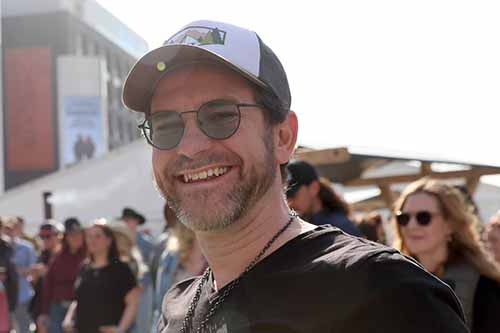
But let’s see how the genre will develop the next years. I think we have to get a little bit more positive. It is the right time for everyone to be in country music, in new country music. For you, Florian, that you are active, I love it so much that we met at the C2C. And it is such a nice community. So we have so many people now, in the southern part of Germany and in the northern part, Hamburg and so on. But that wasn’t the case one year back or two years back. Anyhow, there were some, you know, country lovers in Hamburg or in Berlin, but not as many as there are now. From the official report, what I have seen from Semmel booking regarding the C2C, It was a growth when we talk about the number of visitors. I cannot judge if it is the case, but it’s amazing. And I think that’s that’s the real that’s the reality.
FLYC: What are the next steps, you think?
Tom: Let’s see what what comes up next. But as many people are, supporting the genre out of a musician point of view as I do or Nik or out of a press point of view, like you do, or the radio station, it is important that we do it very regularly. Just a one shot doesn’t help anything. So implementing ideas, new thinkings on different channels, different news platforms, radio setups, podcasts, whatever. Finally, everyone shall find his own fit on how he can support the genre if he likes the music. That is important. And to find the music attractive, I would say it in that term. ;aybe you can translate it in a bit different way, but finding this genre attractive for yourself on every day. There’s so much great stuff comong out of Nashville.
So what I see now and hearing what Snoop Dogg is having in pipe this will be awesome. And because I have sometimes some chats with the guys who are playing his stuff and recording the stuff in the studios, like Jerry Rowe on drums. All this understanding in the music helped me to be there in Nashville. I’ve been there in Nashville several times last year, as you know, for the CMA Fest, the CMA Awards and so on. I have been to studios and talked with some guys from labels and the CMA and their headquarter in the office. And that was very, very important. Without these different journeys over there, I would never have this kind of feeling what is going on in Music City. And that is important that we take this from the States and get it here and maybe try to modify it in a German way. So you know the songs of Nik Wallner. For everyone who is reading or listening to this now, it’s great music.
FLYC: You mentioned the C2C in Berlin and mentioned that there were some things you weren’t too happy about. I guess you won’t disclose them. But which kind of artists would you like to pick for next year? Especially if you don’t have money restrictions as well.
Tom: So I have to say that, since the sold out show of Combs in Hamburg in October 2023, this would be one of my favorites. For Sunday or Saturday. What I have seen on YouTube and what I got from from who who have been on Sunday there that Lainey Wilson was, you know, presenting herself in a very professional kind of way. Her voice was stunning. However, I have also heard that it was very not that a really emotional performance from her. She was just playing a gig. But I would love to see her, definitely. I mean, I’m in the comfortable situation since November from the CMA Awards that I have seen anyone I wanted to see. So Chris Stapleton, holy cow, seeing him live is amazing. It’s just, I was just freaking out. So Chris Stapleton was an amazing, Keith Urban was also great, just mainly playing the guitar. He was he’s also a great musician. I mean, it just has to the fit. It is a money thing behind the scenes because it is very expensive to get to get these guys over here. And it has to make sense for them, coming to us as the main artist. These people are due to go and add the C2C in Berlin with London and Glasgow. So it would be a tour set up. There are so many.
I mean, Snoop Dogg would be awesome, to be honest, because I love this guy. I don’t know why I love his vibe. I don’t agree with many of his songs, to be honest. But he comes straight from West Coast and he loves now he gets so attracted about Nashville, what I hear. And that is that is the special thing. Ed Sheeran, maybe you have heard that he was also playing some shows in Nashville on Broadway. And he also told in interviews that he just loved the vibe. It is very individual. It is like the vibe in New York for soul , funk and R&B. It is a very, very individual thing there. And you never find this New Yorker sound anywhere else. Or, for sure, jazz in New York. You never find that kind of professional jazz anywhere else in the world. But getting this stuff over here more and more. So the C2C is the right setup. And I would love to see many, many more. But 49 Winchester, gosh, I have seen them at the CMA Fest in summer last year, again, and then on the Saturday at the C2C. These guys are killing it from a musical standpoint, how they play their instruments and how they interact. I love their vibe on stage. I have never seen them just playing a gig. It is always very emotional, very, very focused, but always with the goal on we as 49 Winchester as a school band originally, we want to entertain anyone down there, in this arena. And that is what I feel and see any time from these guys. That’s the main reason why I love them. Yeah, but there are so many, too many. But newcomers, newcomers are missing. And I try to get this fixed.
FLYC: Very good. Maybe slowly closing the interview, getting a bit more personal about you. Do you have upcoming country music projects as a musician as well? Nik Wallner, you mentioned. Anything else coming?
Tom: Currently not, no. So Nik is my current focus still. We were ramping up our band now. As you may know, I was playing with, you know it, I was playing with Nik many, many gigs just as a duo. So he on guitar and singing and I was playing a drums and a bit of a percussion thing. But now we have our band. Two new guys out of Munich. I love these guys and they love the music. We were playing a gig at Tegernsee in a casino. It’s not so long ago. And we have to ramp up this, we need to focus now on the project more out of a business focus. So the musical setup is now okay-ish. Yeah, it is better with four guys than compared to as a duo. You can play more harmonies, you can do more with background vocals and stuff. You can play it with more, you know, punch for sure. And you more play it as the rock pop stuff as the music got written originally. Sorry, I can talk about Nik and the project two weeks long. It is Nik Wallner, simply because I love the music. I love to be part of the project. And there is more. So there will be more chances, definitely, to present this good music and future new good music from Nik to the to the audience in Germany, Austria, Switzerland. That sort of region is the focus with this project, really. It’s not international or anything. But getting him and the project really set in the new country scene is the artist in Germany is my goal.
FLYC: To finish, a quick and easy question. So imagine Tom Ganter is playing the drums for a major country artists and of course, you can pick it. Which country artists would you love to play the drums for?
Tom: I do not say Luke Combs because I know the drummer very well. And I don’t want to steal his position. No. It is currently, it would be Lainey Wilson, really, because I love, I love the music. And It would be Chris Stapleton. I set a very, very thick point behind Chris Stapleton
Follow Tom Ganter Online
Music in/from Munich
Here are all my Music & Media postings related to Munich:
Nik Wallner
Here are all my postings related to German country artist Nik Wallner:








